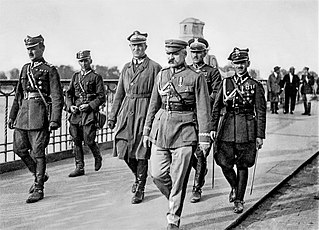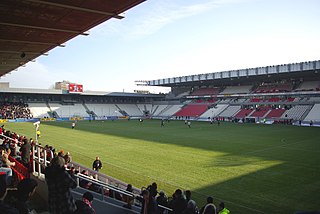The Marshal Józef Piłsudski Stadium may refer to:
- Józef Piłsudski Stadium (Bydgoszcz)
- Józef Piłsudski Stadium (Kraków)
- Józef Piłsudski Stadium (Radom)
- Polish Army Stadium (Marshall Józef Piłsudski Legia Warsaw Stadium)
The Marshal Józef Piłsudski Stadium may refer to:

Józef Klemens Piłsudski[a] was a Polish statesman who served as the Chief of State (1918–1922) and first Marshal of Poland. In the aftermath of World War I, he became an increasingly dominant figure in Polish politics and exerted significant influence on shaping the country's foreign policy. Piłsudski is viewed as a father of the Second Polish Republic, which was re-established in 1918, 123 years after the final partition of Poland in 1795, and was considered de facto leader (1926–1935) of the Second Republic as the Minister of Military Affairs.
Sanation was a Polish political movement that was created in the interwar period, prior to Józef Piłsudski's May 1926 Coup d'État, and came to power in the wake of that coup. In 1928 its political activists would go on to form the Nonpartisan Bloc for Cooperation with the Government (BBWR).
Józef Piłsudski (1867–1935) was a Polish politician, military leader, marshal and Chief of State.

Maria Piłsudska, was a Polish socialist and independence activist, the first wife of Poland's Chief of State Józef Piłsudski and ostensibly the first lady of Poland during most of his service as Poland's Chief of State.

Intermarium was a post-World War I geopolitical plan conceived by Józef Piłsudski to unite former Polish–Lithuanian Commonwealth lands within a single polity. The plan went through several iterations, some of which anticipated the inclusion of neighbouring states. The proposed multinational polity would have incorporated territories lying between the Baltic, Black, and Adriatic Seas, hence the name Intermarium.

The Polish Legions was a name of the Polish military force established in August 1914 in Galicia soon after World War I erupted between the opposing alliances of the Triple Entente on one side and the Central Powers on the other side, comprising the German Empire and Austria-Hungary. The Legions became "a founding myth for the creation of modern Poland" in spite of their considerably short existence; they were replaced by the Polish Auxiliary Corps formation on 20 September 1916, merged with Polish II Corps in Russia on 19 February 1918 for the Battle of Rarańcza against Austria-Hungary, and disbanded following the military defeat at the Battle of Kaniów in May 1918, against Imperial Germany. General Haller escaped to France to form the Polish army in the West against the anti-Polish German-Bolshevik treaty.

The May Coup was a coup d'état carried out in Poland by Marshal Józef Piłsudski from 12 to 14 May 1926. The attack of Piłsudski's supporters on government forces resulted in an overthrow of the democratically-elected government of President Stanisław Wojciechowski and Prime Minister Wincenty Witos and caused hundreds of fatalities. A new government was installed, headed by Kazimierz Bartel. Ignacy Mościcki became president. Piłsudski remained the dominant politician in Poland until his death in 1935.

Piłsudski Square, previously Victory Square and Saxon Square, is the largest city square of Poland's capital, located in the Warsaw city centre. The square is named after Marshal Józef Piłsudski who was instrumental in the restoration of Polish statehood after World War I.

Walery Jan Sławek was a Polish politician, freemason, military officer and activist, who in the early 1930s served three times as Prime Minister of Poland. He was one of the closest aides of Polish leader, Józef Piłsudski.

The Józef Piłsudski Stadium is a football stadium located in Kraków, Poland. It is used mostly for football matches and it is the home ground of Cracovia and Puszcza Niepołomice. Originally, the first Cracovia stadium was built in 1912. It was demolished in mid-2009. From then until late 2010 entirely new construction was raised in roughly the same location where the old stadium stood. After reconstruction the stadium holds 15,114 people. The stadium meets the criteria for UEFA Category 3
Bezdany raid was a train robbery carried out on the night of 26/27 September 1908 in the vicinity of Bezdany near Vilna on a Russian Empire passenger and mail train by a group of the Combat Organization of the Polish Socialist Party led by Józef Piłsudski.

Leon Wasilewski (1870–1936) was an activist of the Polish Socialist Party (PPS), a coworker of Józef Piłsudski, Polish Minister of Foreign Affairs, designer of much of Second Polish Republic policy towards Eastern Europe, historian and father of Halszka Wasilewska and of Wanda Wasilewska.

The House of Piłsudski is a family of nobility that originated in the Grand Duchy of Lithuania and whose notability increased under the Polish–Lithuanian Commonwealth and the Second Polish Republic.
Józef Piłsudski Institute can refer to:

Bronisław Piotr Piłsudski was an ethnologist who researched the Ainu people after he was exiled by Tsar Alexander III of Russia to the Far East.
Pope John Paul II reigned as Pope of the Catholic Church (1978–2005).
The teams competing in Group 7 of the 2015 UEFA European Under-21 Championships qualifying competition were Sweden, Turkey, Greece, Poland and Malta.
Piłsudski is a Polish surname. Notable people with the surname include:
The Kraków Stadium may refer to various stadiums in Kraków, Poland.
Józef Piłsudski Park or Marshal Józef Piłsudski Park is the name of several parks in Poland dedicated to Józef Piłsudski: